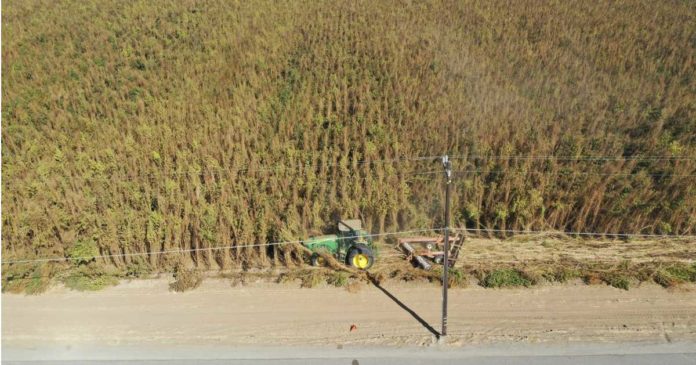In the USA, the case of ten million cannabis plants destroyed by Kern County Sheriff’s Office has taken an interesting turn.
KGET reported late last week a $1 billion claim has been made against the County of Kern, resulting from the Sheriff’s Office destroying millions of hemp plants in Arvin it claimed to be marijuana.
We reported on this last week, noting one of the images provided by the Sheriff’s Office showed what looked to be plants grown as hemp for fibre or food; not for THC or even cannabidiol. The crop was very dense and even plants destined for CBD extraction are usually grown further apart. But solid details in the Sheriff’s Office release were scant and there were some other questionable points.
The company connected to the crop has been reportedly identified – and it seems there’s an interesting backstory to this event.
This article on Bakersfield.com dated September 30 indicates even well prior to the Sheriff’s Office action, questions had been raised regarding the THC content of the crop – and it turns out it was being grown for cannabidiol extraction rather than food or fibre; not that there’s a problem with that per se.
The article says a federal loophole, more a grey area, is perhaps being exploited.
“Under the 2014 Farm Bill, businesses registered as research institutions — in this case, a Colorado company operating locally under the name Apothio LLC — are permitted to grow and possess hemp that’s “hot,” defined as having a THC concentration greater than 0.3 percent.”
But what about California law? The California Department of Agriculture says industrial hemp is:
“.. limited to types of the plant Cannabis sativa L. having no more than three-tenths of 1 percent tetrahydrocannabinol (THC) contained in the dried flowering tops, whether growing or not; the seeds of the plant; the resin extracted from any part of the plant; and every compound, manufacture, salt, derivative, mixture, or preparation of the plant, its seeds or resin produced therefrom.”
Above that limit and it’s considered marijuana, but it’s not clear if California’s laws also have the “hot hemp” exemption for research institutions – or if in the absence of anything specific, federal law kicks in.
The Bakersfield article also mentions the crop could be worth an estimated $1 billion – the same figure that the Sheriff’s Office put on it.
No doubt we’ll be hearing more about this curious case, particularly given the potential dollars involved.


